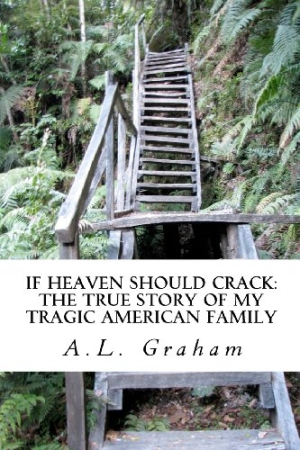
If Heaven Should Crack
The True Story of My Tragic American Family
The popularity of genealogy has exploded in recent years, made easier through use of the Internet as a search tool. Some like the mental stimulation of finding obscure facts about their heritage, while others feel driven to uncover the truth behind puzzling childhood circumstances.
Owing to the time period, A. L. Graham conducted her search with limited access to electronic devices, but was nevertheless able to discover crucial family information. A retired supervisor of social services, and resident of San Francisco’s East Bay, Graham’s first book, If Heaven Should Crack: The True Story of My Tragic American Family, begins with a revelation discovered through a genealogical search done by a friend of her younger sister, Amy.
As children, the sisters were told that their parents had no family, so the news—when Graham is sixty-five and Amy somewhere in her fifties—that their mother and father had siblings was quite a shock. Graham had never understood why her parents were so secretive about their pasts, but she knew that their impenetrable silence had adversely affected her. She felt compelled to find her parents’ relatives. She and Amy began by searching public records in the Bay area, where they grew up. They soon realized that the only evidence they had of their parents’ marriage was a note stating their names, the date, and the location of the union, written in their father’s hand on the back of one of Amy’s report cards. They wrote to the Minnesota records department for a copy of the marriage license, but none was found.
Graham remembers her mother dancing with joy at hearing a radio report of King Edward VIII’s abdication of the throne so he could marry a divorced woman. Now uncertain if her parents were ever actually wed, she wonders if that news gave her mother hope of being able to marry.
The author uses the childhood home as a metaphor for the rock-solid support that children need to feel secure. Because of their secret past, her parents failed to create a safe home environment, though Graham writes, “My parents did not set out to undermine the foundation of our family.”
After Graham and her sister advertise for information about the family in regional Minnesota newspapers, a reporter from the Chisholm paper offers to write a human-interest story about the search. Respondents to that story provide promising new leads. “Jean wrote that she knew my family,” Graham says. “Aunt Lois, my father’s sister, had taken care of her when they lived in Michigan.”
Graham’s writing reveals a keen understanding of human nature and interaction. She adds a mystical tone to the memoir by telling the family’s convoluted history. However, the largely expository narrative fails to portray Graham’s characters and the events surrounding them clearly enough to bring them to life. Plot points intended to create suspenseful tension fail to do so.
In addition, the text seems hastily written, lacking the careful editing that would have corrected misspelled and out-of-sequence words, such as “envelop” for “envelope,” and the phrase “In of my imagination.” Other typographical errors and unnecessary repetition of information abound.
Nevertheless, If Heaven Should Crack will appeal to readers interested in genealogy and how family troubles reverberate through time.
Reviewed by
Margaret Cullison
Disclosure: This article is not an endorsement, but a review. The publisher of this book provided free copies of the book and paid a small fee to have their book reviewed by a professional reviewer. Foreword Reviews and Clarion Reviews make no guarantee that the publisher will receive a positive review. Foreword Magazine, Inc. is disclosing this in accordance with the Federal Trade Commission’s 16 CFR, Part 255.
